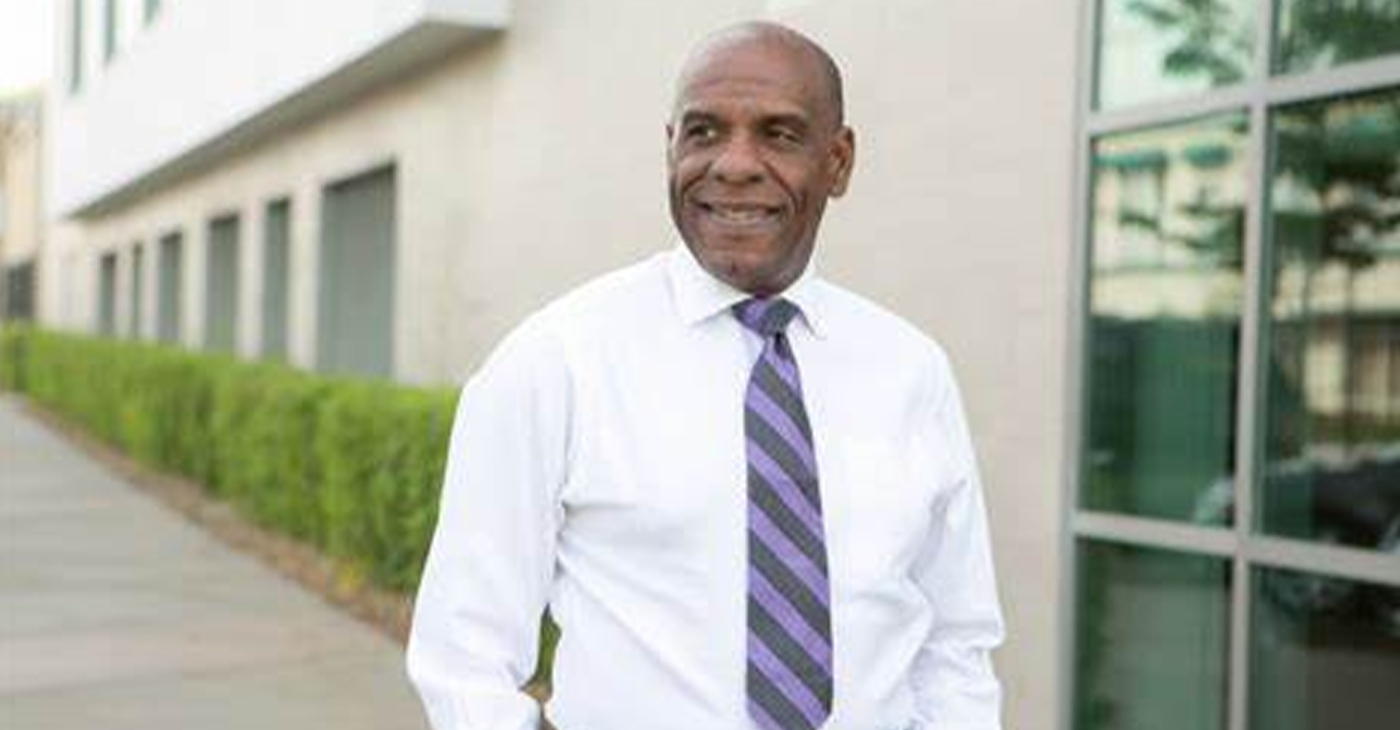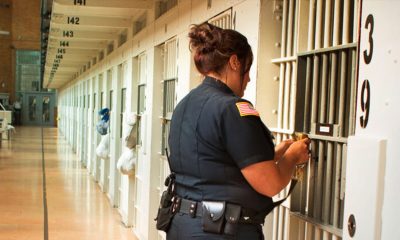Politics
Use of Video Visits for Inmates Grows, Along with Concerns

In this photo taken on Tuesday, May 5, 2015, inmate Jesse Cole is shown on a television screen as his son William, 4, center, reaches to touch the screen while his mother, Edna, holds 8-month-old Jesse James, during a video visitation with at the Fort Bend County Jail, in Richmond, Texas. Prisoners rights advocates are worried that the growing use in the U.S. of video technology to facilitate visits between inmates and their family and friends at county jails and prisons is part of a trend to eliminate the more traditional in-person visit. But officials who run these facilities say video visitation has been a boon to their efforts to improve security and increase visiting hours. (AP Photo/David J. Phillip)
JUAN A. LOZANO, Associated Press
RICHMOND, Texas (AP) — Four-year-old William Cole saw his father’s face and reached out to touch it during a jail visit. But he could only feel a video screen.
The facility in Fort Bend County, southwest of Houston, is among a growing number of jails and prison systems across the U.S. in which video visitation has replaced the more familiar in-person visits, where people are in the same room but separated by thick glass.
William’s mother found it jarring to have to communicate with her husband through pixels rather than face to face. In video visitation, inmates and their visitors are not in the same room but see each other on computer or television screens.
“This was a very big shock for me,” said Edna Cole, 24, as her son talked with his dad from one of 34 screens in the jail’s visitation area. “I’m used to actually being able to see them in person, and here I can’t do that.”
Officials who run the facilities say video visits have improved security and increased visitation hours. However, prisoners’ rights advocates worry the trend is to eliminate free in-person visits for a system they say is full of technical glitches and could eventually require families to pay a fee.
Because of the backlash, the Texas House recently approved a bill guaranteeing a minimum of two in-person visits per week at county jails, but it’s unclear if the measure will pass the Senate.
According to the Prison Policy Initiative, a Massachusetts-based nonprofit group, about 545 correctional facilities (mostly county jails) in 43 states and the District of Columbia use video visitation. While video visitation was first used in the 1990s, much of its growth has taken place the last two to three years.
A report in January by the nonprofit found that 74 percent of county jails banned in-person visits when they started using video visitation. In Texas, of the 23 counties using video visitation, 13 have eliminated in-person visits.
The group also found that at least one of the major companies in video visitation, Dallas-based Securus Technologies, has included language in its contracts requiring the elimination of in-person visits.
Bernadette Rabuy, with Prison Policy Initiative, said video visitation can be beneficial as it allows inmates in facilities far from loved ones to have contact. While it is currently not a big money maker for companies, Rabuy is concerned video visitation will become a large revenue source as people are pushed to use it from home. While video visitation is usually free at a jail, fees to use it from home can be up to $1.50 per minute.
In Fort Bend County, video visitation — in use since 2009— improved efficiency and security as inmates no longer had to be moved to visiting areas and it ended the passing of contraband between visitors and inmates, said Sheriff’s Office Lt. Daniel Quam. The change also freed up personnel and extended visitation hours, he said.
Quam said his agency has focused on providing the best service possible, including building a room for use by families and offering 30 minute visits when state law only requires 20 minutes.
The Arkansas Department of Correction, which in April approved a video visitation contract, will not eliminate in-person visits, said spokeswoman Cathy Frye. In the U.S., nearly 30 state prison systems use video visitation.
A December report by the National Institute of Corrections recommended using both in-person and video visitation.
Sue Gregory, 50, who used video visitation last year when her husband was held at a detention center in Camp Verde, Arizona, said video visits eliminate human interaction that’s beneficial for inmates.
“If the only way you have to visit is through a TV monitor, that is not a real visit,” she said.
Travis County, which includes the state capital of Austin, eliminated in-person visits in 2013 but is discussing whether to bring them back. Two lawsuits were filed this year in Denton County, Texas, after in-person visits were eliminated.
Sheriff Dan Staton considered ending in-person visits in the Oregon county that includes Portland after signing a contract with Securus Technologies that called for doing so. But after listening to community feedback, Staton decided to have both video visitation and in-person visits in Multnomah County.
In Arkansas, Securus didn’t push for the elimination of in-person visits in its contract with the state but offered a higher commission from revenue if the state urged inmates to use the service, Frye said
Josh Gravens, with Texas CURE (Citizens United for Rehabilitation of Errants), a prisoners’ rights group, said a large group mobilized last year in Dallas County after officials considered approving a video visitation contract with Securus that would have eliminated in-person visits. That contract was rejected, and another that included both forms of visitation was later approved.
Earlier this month, Securus announced it would no longer include in its contracts restrictions related to in-person visits. A spokesman for Securus did not respond to numerous phone calls and emails seeking comment.
Philip Hilder, a Houston criminal defense attorney and former federal prosecutor, said while the Supreme Court has found that jail and prison visits can be restricted, the rise of video visitation could mean it’s time to revisit the issue.
“There is room for technology to play a role here,” Hilder said. “But to say that technology should supplant personal visitation would be a grave error. I think it would create a lot more problems because people will feel much more disconnected by not having that human element.”
___
Follow Juan A. Lozano on Twitter at www.twitter.com/juanlozano70
Copyright 2015 The Associated Press. All rights reserved. This material may not be published, broadcast, rewritten or redistributed.
Activism
Oakland Post: Week of April 17 – 23, 2024
The printed Weekly Edition of the Oakland Post: Week of April 17 – 23, 2024

To enlarge your view of this issue, use the slider, magnifying glass icon or full page icon in the lower right corner of the browser window. ![]()
Barbara Lee
Congresswoman Barbara Lee Issues Statement on Deaths of Humanitarian Aid Volunteers in Gaza
On April 2, a day after an Israeli airstrike erroneously killed seven employees of World Central Kitchen (WCK), a humanitarian organization delivering aid in the Gaza Strip, a statement was release by Rep. Barbara Lee (D-CA-12). “This is a devastating and avoidable tragedy. My prayers go to the families and loved ones of the selfless members of the World Central Kitchen team whose lives were lost,” said Lee.

By California Black Media
On April 2, a day after an Israeli airstrike erroneously killed seven employees of World Central Kitchen (WCK), a humanitarian organization delivering aid in the Gaza Strip, a statement was release by Rep. Barbara Lee (D-CA-12).
“This is a devastating and avoidable tragedy. My prayers go to the families and loved ones of the selfless members of the World Central Kitchen team whose lives were lost,” said Lee.
The same day, it was confirmed by the organization that the humanitarian aid volunteers were killed in a strike carried out by Israel Defense Forces (IDF). Prior to the incident, members of the team had been travelling in two armored vehicles marked with the WCF logo and they had been coordinating their movements with the IDF. The group had successfully delivered 10 tons of humanitarian food in a deconflicted zone when its convoy was struck.
“This is not only an attack against WCK. This is an attack on humanitarian organizations showing up in the direst situations where food is being used as a weapon of war. This is unforgivable,” said Erin Gore, chief executive officer of World Central Kitchen.
The seven victims included a U.S. citizen as well as others from Australia, Poland, the United Kingdom, Canada, and Palestine.
Lee has been a vocal advocate for a ceasefire in Gaza and has supported actions by President Joe Biden to airdrop humanitarian aid in the area.
“Far too many civilians have lost their lives as a result of Benjamin Netanyahu’s reprehensible military offensive. The U.S. must join with our allies and demand an immediate, permanent ceasefire – it’s long overdue,” Lee said.
Community
Financial Assistance Bill for Descendants of Enslaved Persons to Help Them Purchase, Own, or Maintain a Home
California Legislative Black Caucus (CLBC) vice chair Sen. Steven Bradford (D-Inglewood) introduced new legislation related to reparations to the Senate Committee on Housing on April 2 in Sacramento. Senate Bill (SB) 1007, “establishes the Homeowner’s Assistance for Descendants of Enslaved Persons Program to make financial aid or assistance available to descendants for the purposes of purchasing, owning, or maintaining a home,” the legislation states.

California Legislative Black Caucus (CLBC) vice chair Sen. Steven Bradford (D-Inglewood) introduced new legislation related to reparations to the Senate Committee on Housing on April 2 in Sacramento.
Senate Bill (SB) 1007, “establishes the Homeowner’s Assistance for Descendants of Enslaved Persons Program to make financial aid or assistance available to descendants for the purposes of purchasing, owning, or maintaining a home,” the legislation states.
The Senate Housing Committee advanced the bill with an 8-1 vote. It will be re-referred to the Appropriations Committee for consideration.
Sen. Kelly Seyarto (R-Murrieta) was the only member who voted against the bill.
“SB 1007 is about starting a long process of paying back a debt that is not only owed, but that was also promised, and is 160 years overdue, to African Americans,” Bradford told the committee chaired by Sen. Nancy Skinner (D-Berkeley). “It is the first step in closing the wealth and equity gap created by centuries of slavery and racial discrimination policies.”
The bill aligns with one of the 115 recommendations listed in a two-year study conducted by the California reparations task force, of which Bradford was one of nine members.
Bradford said the report reveals that, in the state of California, a typical Black-owned home is 22% less valuable than a White-owned home.
Various advocacy groups from around the state attended the hearing held at the State Capitol Annex Swing Space. The California Housing Partnership, Bay Area Regional Health and Inequities Initiative, Coalition for A Just and Equitable California, Disability Rights of California, the American Civil Liberties Union of California, and California Community Builders all voiced their support of the bill.
-

 Activism4 weeks ago
Activism4 weeks agoOakland Post: Week of March 20 – 26, 2024
-

 #NNPA BlackPress3 weeks ago
#NNPA BlackPress3 weeks agoCOMMENTARY: D.C. Crime Bill Fails to Address Root Causes of Violence and Incarceration
-

 #NNPA BlackPress3 weeks ago
#NNPA BlackPress3 weeks agoMayor, City Council President React to May 31 Closing of Birmingham-Southern College
-

 #NNPA BlackPress4 weeks ago
#NNPA BlackPress4 weeks agoCOMMENTARY: Lady Day and The Lights!
-

 #NNPA BlackPress3 weeks ago
#NNPA BlackPress3 weeks agoFrom Raids to Revelations: The Dark Turn in Sean ‘Diddy’ Combs’ Saga
-

 #NNPA BlackPress3 weeks ago
#NNPA BlackPress3 weeks agoBaltimore Key Bridge Catastrophe: A City’s Heartbreak and a Nation’s Alarm
-

 Activism3 weeks ago
Activism3 weeks agoOakland Post: Week of March 27 – April 2, 2024
-

 #NNPA BlackPress3 weeks ago
#NNPA BlackPress3 weeks agoBaltimore’s Key Bridge Struck by Ship, Collapses into Water


















































